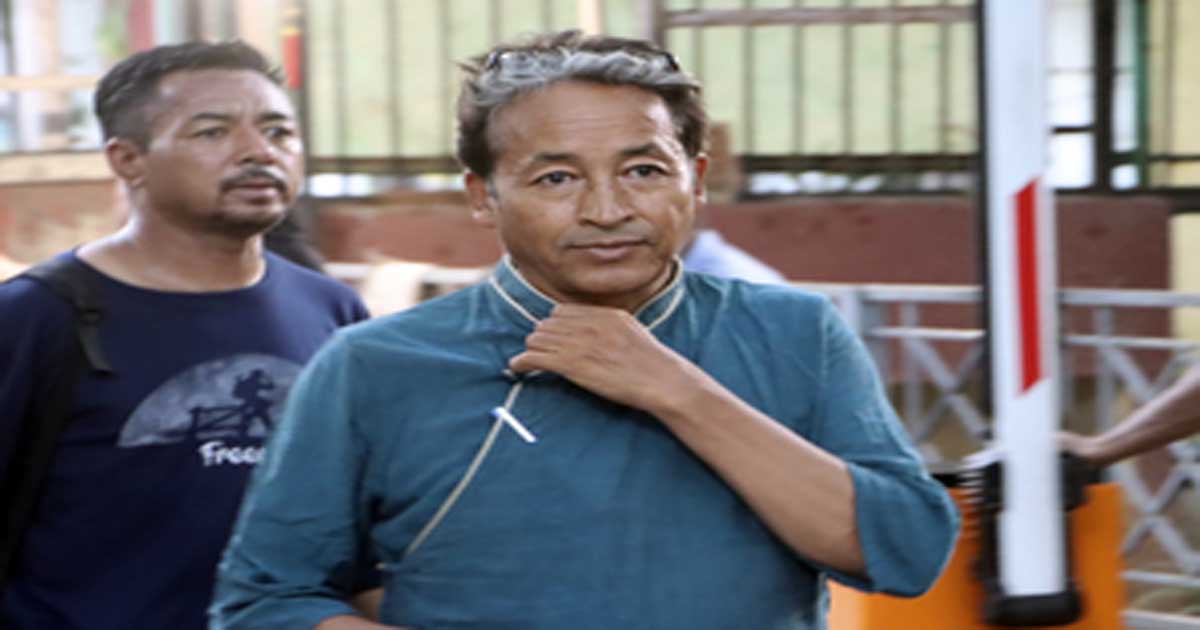Crime
Army rescues woman in distress in J&K’s Poonch
Timely rescue by the Indian Army has saved a woman’s life in J&K’s Poonch district.
A defence spokesman said, “On the night of January 27, 2022, the Indian Army received a distress call from the border area village Tuglu, Noorkote in Poonch district for medical assistance to a woman, namely Rukhsana Kausher, who was in labour pain.
The Indian Army troops responded promptly. With the help of locals, the distressed woman was evacuated to the nearest road head and further to the nearest civil Hospital thereby saving her life, said the army.
Crime
Rs 4,300 crore loan fraud: ED seizes Rs 67 crore assets of power company, officials

Nagpur, Oct 24: The ED attached movable and immovable properties worth Rs 67.79 crore in the form of bank balances, lands, buildings and flats linked to a businessman and a coal-based power project company involved in a Rs 4,300 crore bank loan fraud, said an official on Friday.
The Nagpur zonal unit of the ED took action against properties situated across Maharashtra, Kolkata, Delhi and Andhra Pradesh in the name of Manoj Jayaswal, his family members and others.
The operation on October 16 was conducted under the provisions of PMLA, 2002, in the case against Corporate Power Limited and others. The total attachments/seizure/frozen bank assets in this case now stand at Rs 571 crore.
The money laundering case against the company and its officials is linked to a proposed coal-based power plant in Jharkhand of 1080 MW power for which a loan was taken from a consortium of 20 banks led by the Union Bank of India.
The ED initiated its PMLA investigation based on an FIR registered by the Central Bureau of Investigation (CBI) against Corporate Power Limited, its promoters, directors, and others for criminal conspiracy, cheating, and forgery.
The federal agency probe revealed that the accused created a network of 800 shell companies and 5,000 bank accounts to misappropriate the loan funds that were declared non-performing assets (NPA) in 2013-14.
Earlier, the agency had conducted searches in Kolkata, Nagpur and Visakhapatnam in the case and recovered cash, documents, and seized movable assets like mutual funds, securities and term deposits.
The CBI, after registering an FIR, said in a statement in 2022 that the Union Bank of India, the lead lender of the consortium, declared the account as non-performing assets (NPA) on September 30, 2013, and subsequently, the other member consortium banks also classified the said account as NPA.
The accounts of the said borrower company were declared as fraudulent on October 25, 2019, the CBI said in a statement.
Shedding light on the modus operandi used in the Rs 4,307.87 crore loan fraud, the CBI said, “It was further alleged that between the years 2009 to 2013, the said borrower had submitted manipulated project cost statements and also diverted the bank funds.”
It was also alleged that the trade receivables, mainly including transactions to related parties and funds, were diverted to a web of various companies that were dummy accounts; accordingly, the borrower was able to siphon off the funds, the CBI statement said.
Crime
Cyber fraudsters impersonate Damoh collector on WhatsApp; swift action averts potential crisis

Bhopal/Damoh, Oct 24: In a brazen bid to exploit trust and siphon funds from unsuspecting contacts, cybercriminals allegedly created a fake WhatsApp account impersonating Damoh District Collector Sudhir Kochhar, using fabricated documents and a Vietnamese country code to mask their tracks.
The audacious scheme, targeting the collector’s personal network of friends and associates, was thwarted before it could blossom into a full-blown cyber crisis, thanks to the vigilant intervention of the district administration and police.
The impostor account, complete with the collector’s profile picture and official details, began dispatching urgent messages soliciting financial aid under false pretences – ranging from fabricated emergencies to urgent “official” transfers.
Recipients, believing the pleas emanated from the trusted IAS officer, were moments away from compliance when the ruse unravelled.
Collector Kochhar, upon receiving wind of the anomaly through a tip-off from a wary contact, wasted no time in alerting Superintendent of Police Shrutkirti Somvanshi.
“As soon as the information surfaced, my e-governance and cyber teams swung into action,” Kochhar recounted in a press briefing at the SP’s office.
“We traced the suspicious activity within hours, preventing any pecuniary loss.”
A formal complaint against an unidentified perpetrator was promptly lodged at the Damoh SP office, invoking provisions under the Information Technology Act, 2000, and the Bharatiya Nyaya Sanhita for identity theft and attempted fraud.
The cyber cell of Madhya Pradesh Police in Damoh, a specialised unit equipped with advanced forensic tools, has since launched a meticulous probe.
Investigators are delving into digital footprints, including IP logs, device metadata, and the forged credentials used to register the account via WhatsApp’s Vietnamese (+84) prefix – a common ploy to evade Indian jurisdiction and detection algorithms.
“The fraudsters’ use of international codes underscores their sophistication, but our team is collaborating with national cyber agencies to unmask them,” affirmed SP Somvanshi, emphasising round-the-clock monitoring.
This incident is not an isolated skirmish in Madhya Pradesh’s escalating cyber warfare.
Statewide, cyber frauds have surged by 45 per cent in 2025, per Madhya Pradesh Police data, with impersonation scams claiming over Rs 150 crore in losses.
High-profile targets like district collectors are prime prey, as seen in recent cases from neighbouring Gwalior and Sagar, where fake profiles duped officials into transferring lakhs.
Nationally, similar ruses have ensnared bureaucrats in Andhra Pradesh and Kerala, where fraudsters posed as superiors to extract funds via WhatsApp.
Underscoring the gravity, Collector Kochhar issued a stark public advisory: “I maintain no personal IDs on any social media or messaging platforms. Disregard any such accounts purporting to be mine.”
He urged citizens to abstain from engaging with unsolicited requests for money, sharing sensitive details, or initiating transactions, labelling such overtures as hallmarks of cyber entrapment.
“Report anomalies immediately to 1930, the national cyber helpline, or your local police. Vigilance is our collective shield,” he urged, flanked by cyber cell officers demonstrating scam-spotting techniques.
Crime
Sonam Wangchuk case: Advisory Board holds 3-hour discussion in Jodhpur Jail, wife present

Jaipur, Oct 24: The members of the Advisory Board on Friday held a three-hour hearing at Jodhpur Central Jail in Rajasthan to review the detention of environmental activist Sonam Wangchuk under the National Security Act (NSA).
The three-member panel arrived at the jail around 10:30 a.m. from the Jodhpur Circuit House to record Wangchuk’s statements and review documents related to the case. Wangchuk’s wife, Geetanjali Angmo, was also present during the proceedings.
The hearing was conducted by Advisory Board Chairman and former judge M.K. Hujura, District Judge Manoj Parihar and social activist Spal Jayesh Angmo.
The Advisory Board is a special constitutional body constituted under the National Security Act (NSA) 1980, which reviews cases of preventive detention
The closed-door session reportedly focused on the reasons cited by the administration for invoking the NSA and Wangchuk’s representation challenging the same.
Sonam Wangchuk, a well-known innovator and environmentalist from Ladakh, was detained under the National Security Act (NSA) earlier this year. The move triggered nationwide protests and legal challenges, with several rights groups calling the detention arbitrary.
The Supreme Court is also hearing petitions against the government’s action.
Wangchuk’s wife, Geetanjali Angmo, stated that their legal team has challenged both the grounds of detention and the procedural lapses in the case. She alleged that Wangchuk’s statements and videos were distorted and presented out of context, forming a misleading basis for the NSA order.
It determines whether the detention has adequate justification. The board comprises three members, all of whom are sitting or former High Court judges, appointed by the Chief Justice of the High Court of the respective state.
The government must submit all relevant documents to the board within three weeks of detention, and the board must send its report within seven weeks.
Proceedings remain confidential, and detainees are heard in person without the presence of lawyers. The board’s recommendations will determine whether Wangchuk’s detention under the NSA continues or is revoked, said officials.
-

 Crime3 years ago
Crime3 years agoClass 10 student jumps to death in Jaipur
-

 Maharashtra1 year ago
Maharashtra1 year agoMumbai Local Train Update: Central Railway’s New Timetable Comes Into Effect; Check Full List Of Revised Timings & Stations
-

 Maharashtra1 year ago
Maharashtra1 year agoMumbai To Go Toll-Free Tonight! Maharashtra Govt Announces Complete Toll Waiver For Light Motor Vehicles At All 5 Entry Points Of City
-

 Maharashtra1 year ago
Maharashtra1 year agoFalse photo of Imtiaz Jaleel’s rally, exposing the fooling conspiracy
-

 National News1 year ago
National News1 year agoMinistry of Railways rolls out Special Drive 4.0 with focus on digitisation, cleanliness, inclusiveness and grievance redressal
-

 Maharashtra11 months ago
Maharashtra11 months agoMaharashtra Elections 2024: Mumbai Metro & BEST Services Extended Till Midnight On Voting Day
-

 National News1 year ago
National News1 year agoJ&K: 4 Jawans Killed, 28 Injured After Bus Carrying BSF Personnel For Poll Duty Falls Into Gorge In Budgam; Terrifying Visuals Surface
-

 Crime1 year ago
Crime1 year agoBaba Siddique Murder: Mumbai Police Unable To Get Lawrence Bishnoi Custody Due To Home Ministry Order, Says Report












